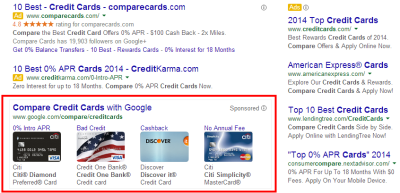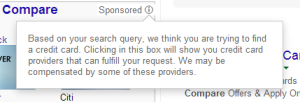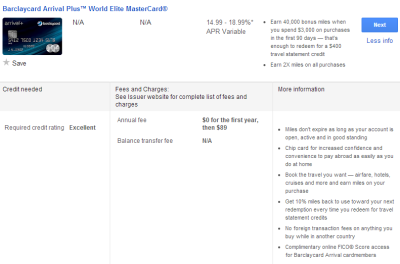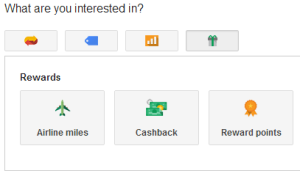
Google Credit Card Compare
Earlier today when doing a Google search for some random credit card related topic, I noticed among the results was a “sponsored” section. While sponsored results are nothing new, this advertisement was for Google’s seemingly new credit card comparison site.
If this has been around, then I certainly haven’t noticed it before. The site can be found here and has a comparison of many of the top cards along with several filtering options.
These Are Affiliate Links

When displaying the ad for this service in their search results, Google shows the word “Sponsored” with a little information bubble next to it. After clicking on this bubble, a text overlay clearly states that Google may receive compensation when you apply for cards through their comparison service.
Is It Useful?
When going to the page initially, you will notice four icons at the top of the page. Each of these represents different types of cards based on your goals. The first button is for balance transfer cards, the second is for cards with 0% interest offers, the third is for people with “bad credit” who are looking to re-establish themselves and the final button which looks like a small present is for rewards cards.
Each of the larger buttons mentioned above has subsequent filter options with the rewards section being the most in-depth. In the rewards section you can filter by Airline miles, Cashback or Rewards points. Once you have found a card you like, clicking “More Info” will expand the entry with additional details such as the annual fee and other card benefits. Clicking “Next” will take you directly to the credit card application page.
Which Banks?
Most of the major banks are represented in Google’s comparison tool. Among the results I found cards from: Discover, U.S. Bank, American Express, Barclay’s & Citibank. While Citibank’s ThankYou & cashback cards are shown, none of their co-branded American Airlines or Hilton credit cards are listed on the site.
Among the banks missing from the comparison engine are: Bank of America, Capital One, Wells Fargo & Chase. Chase is really the glaring omission here, since they are by far the biggest credit card issuer in the travel space.
Should You Use It?

While the answer as to whether or not you should use it is ultimately up to you, I recommend searching a variety of independent sources when researching & applying for credit cards.
There are two reasons you shouldn’t use this as your primary tool of research in my opinion. First off, as I mentioned before, they don’t have all of the banks listed. This means when you are searching for cashback cards, they are missing some of the better cards like the Chase Freedom. The same goes for just about every category.
Additionally, affiliate links do not always provide the best deal. If you want to give Google money by applying through their links then fine, but make sure you are getting the best deal first. I always consult Flyertalk to make sure there isn’t a better unpublished offer.
Conclusion
While I am not quite sure what to think of this, it is clear that Google is getting into the credit card affiliate game. They are already a huge advertising company and it wouldn’t surprise me to find out that they have been getting paid for credit card applications for some time.
Perhaps this Google Credit Card Compare service has been around for awhile, but this was the first time I have seen it. Certainly if it has been around, then they haven’t been displaying it at the top of credit card search results.
What do you think? Is this service a good or a bad thing?



